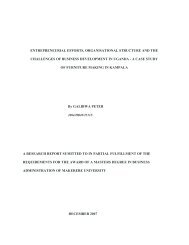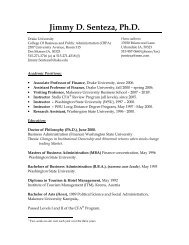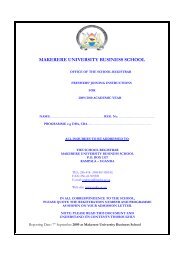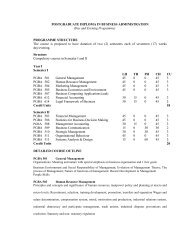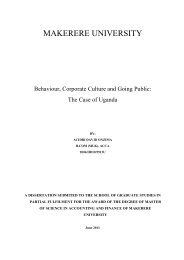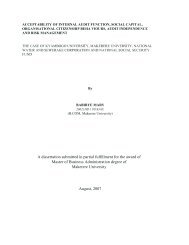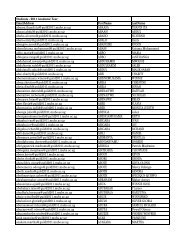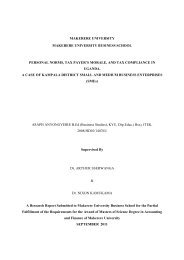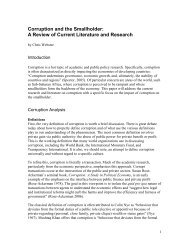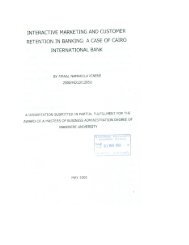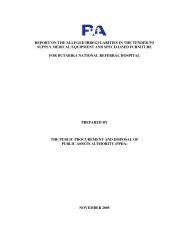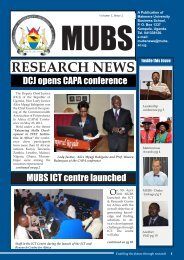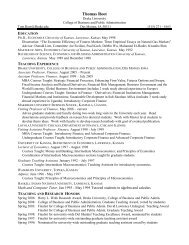13th Annual International Management Conference Proceeding
13th Annual International Management Conference Proceeding
13th Annual International Management Conference Proceeding
Create successful ePaper yourself
Turn your PDF publications into a flip-book with our unique Google optimized e-Paper software.
1. Leadership - Any organizational entrepreneurship team must have leadership. Leadership involves the<br />
discerning ability to strike to the significant part, to clear away the fluff and arrive at reality. Leadership<br />
involves vision, asking what an institution or program or department might become. However, vision is<br />
more than intellectual. It involves the affective realm. The entrepreneur makes that vision effective and<br />
determines ways to make it into a reality.<br />
2. People and their Empowerment - It is people who help successfully complete an entrepreneurial project,<br />
and it is people who will use it.<br />
3. Learning - Entrepreneurship, empowerment, and successful innovation involve learning.<br />
4. Organizational Cultures - Culture is unseen, highly influential, difficult to change, but impossible to<br />
ignore. It affects our perceptions, desires, goals, actions and feelings. Doing entrepreneurship in<br />
organizations means developing a high awareness for the various cultures one encounters. Culture is<br />
shared meaning.<br />
5. Rewards - The three most powerful rewards I have observed in academe are (a) money, (b) time, and<br />
(c) an intrinsic feeling of a job well done.<br />
6. Technology and bureaucracy – involves adequate technology with less bureaucracy<br />
7. Commitment and Community – in intrapreneurial ventures<br />
8. Efficiency and Effectiveness<br />
9. Relentless Dedication<br />
Case study<br />
Mr Maina* (not his real name) quit his job in the 1970s after working for 3 years with the East African industry to<br />
start a transport business, delivering materials for clients within Kenya and outside to as far away as Zambia. The<br />
future looked very bright.<br />
Then the unthinkable happened. Over the years the East African community crumpled and the Tanzanian border was<br />
closed down. At that point in time he hard hired 19 lorries and they were trapped in Tanzania while ferrying<br />
perishable goods. All negotiations could not allow the release of the vehicles across the border so the goods were sold<br />
on the roadside to residents at throwaway prices. The solutions could only be reached at intergovernmental level at it<br />
took six months to reach a solutions. Meanwhile the owners of the trucks were baying for his blood. Things became so<br />
bad that he had to go into hiding.<br />
Driving past a shopping centre in Kiambu one day he stopped to give a lift to a woman who was carrying a heavy load<br />
of maize that she had brought to Kiambu from Kariobangi in Nairobi (about 70 away) to a posho mill. He discovered<br />
there were no posho mills in Nairobi. So he bought a posho mill and set it up at Kariobangi. Waiting for the first<br />
customer with anticipation started. None came. One day, one week, two weeks, three weeks, still no customer.<br />
It was time for a reality check. What had begun as an exiting idea was turning into nightmare! His first experience in<br />
business was still fresh in his mind. Upon investigation of this turn of events he found out that as a result of a<br />
drought/famine that was raging through the land at that time maize was hard to come by particularly in Nairobi. He<br />
was just in the verge of despair when a brilliant idea hit him. Why not buy maize from the cereals and produce board<br />
so he could sell it to people who required maize flour? That way he could rescue his business from a possible stillbirth.<br />
He still had to overcome the hurdles of acquiring a licence to operate a mill in Kariobangi, purchase more maize from<br />
the cereal and produce board especially due to rationing due to the famine. With time his reputation as a reliable miller<br />
grew. He secured a contract to supply maize to prisons in Nairobi and this kept him going even after the famine.<br />
50



